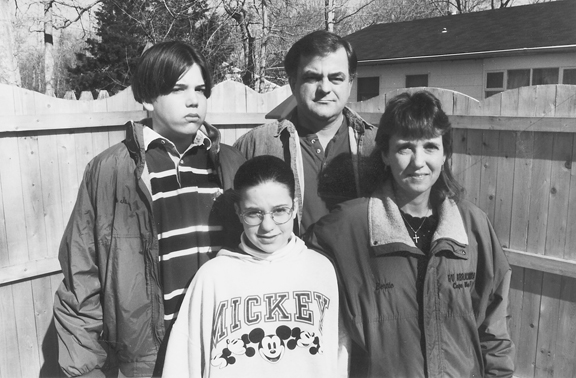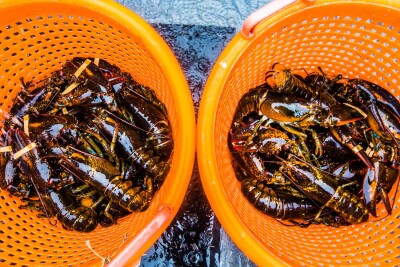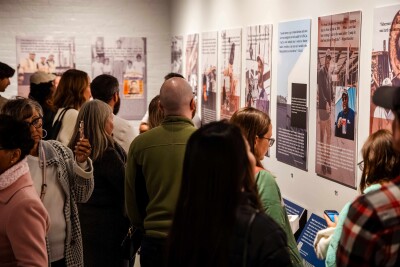JUNE 1997
A New Perspective
After nearly losing a son at sea, a family looks to the future.
By Kirk Moore
Jimmy Harris made national headlines two years ago when, while working 70 miles out to sea on his father's boat, he nearly died after leaking gas knocked him unconscious in a fish hold filled with 12 tons of squid.
The media attention is long gone now. But the effects of the near-tragic accident still linger with Jimmy, his father, his family and the close-knit fishing community of Cape May, N.J.
Jimmy's brush with death made him evaluate whether he still wanted to make a livelihood from commercial fishing. It made Bill and Mike Peter, the crewmen who saved Jimmy's life after discovering him in the 32-degree water in the fish hold, gain a new appreciation for fishing safety and training.
And it forced Jimmy's parents, Jim and Bertie, who have never known anything other than fishing as a way of life, to assess their own future. That includes discussions about possibly buying a second business, maybe a beach motel, to hedge against the uncertainty of a future in fishing. And, when a fisherman last winter made an offer on Harris' 80' trawler, the Abracadabra, it made him think long and hard about the life he has dedicated himself to since he was a teenager.
Sometimes it takes a near-tragedy to put things in their proper perspective. For the Harris family, the miracle of Jimmy's recovery, after he fell into a coma and was hospitalized for weeks, has made them reaffirm their commitment to fishing — something they had always taken for granted.
Jimmy, who is 15, now knows he wants to be a full-time fisherman when he gets older. His father also knows he wants Jimmy to follow in his footsteps. But Jim Harris also wants his son to learn a second trade as a backup to fishing. Jimmy says he's not sure what that will be, but it could be marine mechanics and engineering, or culinary work that builds on his work of fishing for food and his hobby of cooking for his parents and 12-year-old sister, Jennifer.
Two years of healing have put things straight.
"From the day he was born, I planned for him to be in the business," Harris says of his son. "He went out the first time when he was 3 years old."
The accident
Mike Peter was doing pushups on the after deck of the Abracadabra as the boat pulled her squid net on June 20, 1995. In the throes of a divorce, Mike had seized on physical conditioning and delighted in exertion. He remembers joshing and shadowboxing with Jimmy Harris that afternoon on a flat ocean. "He's a little wise guy, I'm a wise guy, and we just bust each other's chops."
Mike went into the deckhouse to read for a few minutes while Jimmy stayed out to clean squid. He had a little deal going to deliver a few pounds of specially packed product for local customers at Cape May.
About 20 minutes later, Jim Harris called out to Mike and Bill Peter, saying it was time to haul back. The brothers went aft and saw that the hatch to the fish hold was open. But there was no sign of Jimmy. They shouted his name and, hearing no answer, knew they had but one place to look: the fish hold.
"We don't usually go in the fish hold, but we had some bycatch of John dory [a fish found near the edge of the continental shelf], and we set off a part of the hold that day for them," Mike Peter recalls.
The brothers dropped into the bottom of the hold in search of Jimmy. Once they hit bottom, their breathing told them there was a failure in the refrigeration system: a Freon leak. Freon, an odorless gas, is much heavier than air and can be dangerous when it leaks in enclosed spaces; it displaces air from the bottom up, almost as if the compartment were flooding with water.
"The second we got down, we started getting dizzy, and Bill said, 'Oh man, there must be a Freon leak,'" Mike Peter says.
"I could feel my head going," Bill Peter recalls.
Jimmy's hat was floating in the water, and the Peter brothers looked for the recirculating water intake, thinking the boy would be drawn toward it by the current. They sloshed through the tank in 2' of freezing water, calling Jimmy's name, "when all of a sudden he just popped up," Mike Peter says.
Mike ran up the ladder and to the wheelhouse to deliver three words to Jim Harris: "Little Jimmy's hurt."
"Bill was at the bottom, breathing heavy and holding the kid," Mike Peter says. He crawled back down the ladder, trying not to breathe too deep, and hauled Jimmy up to the hatch ledge. Weak from the Freon, Bill clambered up behind, clinging to the hatch edge until he could suck in more oxygen.
The boy's father told the crewmen to start CPR while he called the Coast Guard. Both brothers had been trained by Cape May emergency medical technicians, and Bill had taken a course only two weeks earlier in offshore first aid and CPR sponsored by a Cape May fishermen's association and New Jersey Sea Grant.
"There were a lot of things fresh in my mind," Bill says.
Bill compressed Jimmy's chest to get his heart pumping again and coached Mike on getting Jimmy's lungs to inflate. When Jimmy's breathing and pulse started again, they got a sleeping bag from the bunks, took off the boy's soaked clothes and some of theirs to warm him and stop the onset of hypothermia.
After that, there was little they could do until a Coast Guard helicopter arrived, lowering a basket and rescue crewman to hoist Jimmy off the deck. As Jim Harris that night steamed the Abracadabra toward land and an offshore rendezvous with a friend in a speedboat, who raced him in to keep vigil at his son's bedside, he got word that the boy had fallen into a coma.
When the news arrived, Mike and Bill Peter sat at the galley table. "What's going on?" Mike silently mouthed to Bill.
"He's in a coma," Bill whispered back.
"I just went back in my bunk and started praying and swearing off every bad thing I ever did," Mike Peter recalls.
Recovery
Two days later, Jimmy was transferred by ambulance to St. Christopher's Hospital for Children in Philadelphia, where doctors specializing in pulmonary medicine used techniques usually applied on prematurely born babies whose lungs are not fully developed.
The squid tank water had scoured Jimmy's lungs of natural secretions that keep the lung tissue flexible. By using an artificial replacement, called a surfactant, the doctors gradually helped Jimmy's lungs reinflate.
He started coming out of his coma a week or so later, and within two weeks, he was breathing on his own without a respirator. There were setbacks, like when one lung collapsed, but after four straight weeks in the hospital, Jimmy returned home. Today some of his lung capacity is still diminished, creating an asthma-like condition, but he suffers no other long-term effects.
Jimmy's physical recovery was complete, but the emotional recovery for the family took longer. The incident made Jim Harris evaluate his future, a tough call for someone who has fished since he was 14 and quit school at 16 to fish full-time. The accident also took a toll on his son.
Jimmy doesn't talk much about the accident and says it didn't affect him too much. But his father observed that his son had to learn to be comfortable on the boat again.
"Last summer I could see he didn't want to go on the boat with me," Harris says. "He never said that much to me, but I didn't push him."
As for his own feelings, "I couldn't walk down in there," Harris explains. "So I'd just stay up in the house and let the other guys work back there."
Harris' commitment to fishing was put to the ultimate test this winter when someone offered to buy the Abracadabra, a boat Harris has fished since 1984 and owned since 1986. Harris had to make the hard decision about whether to get out of fishing. The memory of his son lying in the fish hold was still with him. But after some serious soul searching and discussions with his family, his love for fishing won out.
"I nearly backed out of it, a little leery, because I haven't done anything else," Jim Harris says.
Nowadays, the Harris family is active and committed to the fishing community and the industry. Jimmy has decided to make fishing his career. When he's not aboard the Abrac
adabra, he uses the Hocus Pocus — a 17' Carolina skiff — to haul crab pots in the shallow sounds off New Jersey. Last summer he made good money by advertising in a local newspaper and delivering blue crabs direct to customers.
Jim Harris heads the local trawler captains' association, and he and Jimmy have been outspoken at public forums on fisheries issues.
Jim Harris has also taken measures to improve the safety on his boat. He bought Scott Air-packs, a breathing apparatus widely used by firefighters, in case of another gas leak. And the Abracadabra's crew has adopted the golden rule of pipeline workers: Nobody goes into the hold without someone else watching from the top of the ladder.
"There's a lot of guys who don't want their kids to be fishermen, and there are a lot of kids who don't want any part of it either," Mike Peter says. "But Jimmy, he has some guts, I'll tell you. There are days out there when he's seasick, and he just doesn't care.
"He wants to be fishing, and he wants to be with his dad."
SIDEBAR
Training pays off
To some Cape May, N.J., fishermen, the Coast Guard demand for certified safety "drill instructors" on every fishing boat at first looked like a symptom of government overkill.
But after the regulations went into effect, it didn't take long for them to pay off. Less than three weeks after taking a safety course, fisherman Bill Peter applied what he had learned to save the life of 13-year-old Jimmy Harris while fishing 70 miles from land.
A Freon leak in June 1995 knocked out Jimmy Harris and nearly drowned him in the squid tank of his father's boat, the Abracadabra. The accident was a worst-case scenario that shows why fishermen need to be trained in first aid and rescue.
"Jimmy's accident was just so bizarre that you would never expect it. Which, I suppose, goes to show why you need to be prepared for this kind of thing," says Stewart Tweed, a New Jersey Sea Grant agent who helped organize a series of training seminars for fishing industry workers.
In recent years, safety, survival and first-aid classes for fishermen have been sponsored by Sea Grant, the New Jersey Marine Sciences Consortium, the Cape May Seafood Association and other groups. Fishermen have learned how to do everything from using survival suits and flares to extinguishing fires at sea and searching for people lost overboard.
Tweed says one touchy subject is teaching fishermen CPR — or, more precisely, mouth-to-mouth resuscitation. "You'd get a bunch of scallopers together and say, 'You're gonna do CPR on this guy,' and they'd say, 'Not me.'"
Rutgers University, which sponsors Sea Grant in New Jersey, used money from a federal program for farm safety to buy CPR masks that protect first aiders from direct mouth contact with victims.
Bill Peter, a crewman on the Abracadabra, says the "drill instructor" program gave him the skills to save Jimmy Harris. Together with his crewmate and brother, Mike Peter, he got the boy's vital signs back after Jimmy had been immersed for about 20 minutes in 32-degree water.
To get Jimmy's body temperature up, the brothers wrapped the boy in a sleeping bag and hugged him — techniques learned in safety classes. While waiting for the Coast Guard helicopter to pick up Jimmy from the boat, Bill Peter says, "I went back [to the cabin] and got my notebook to see if we had missed anything."
Fishermen's groups and Sea Grant are working on other education projects in Cape May. The latest effort aims to equip fishermen so they can quickly clean up small fuel oil spills for little more than $1,000, rather than the $100,000 or more it can cost to pay a contractor to clean the same spill.







